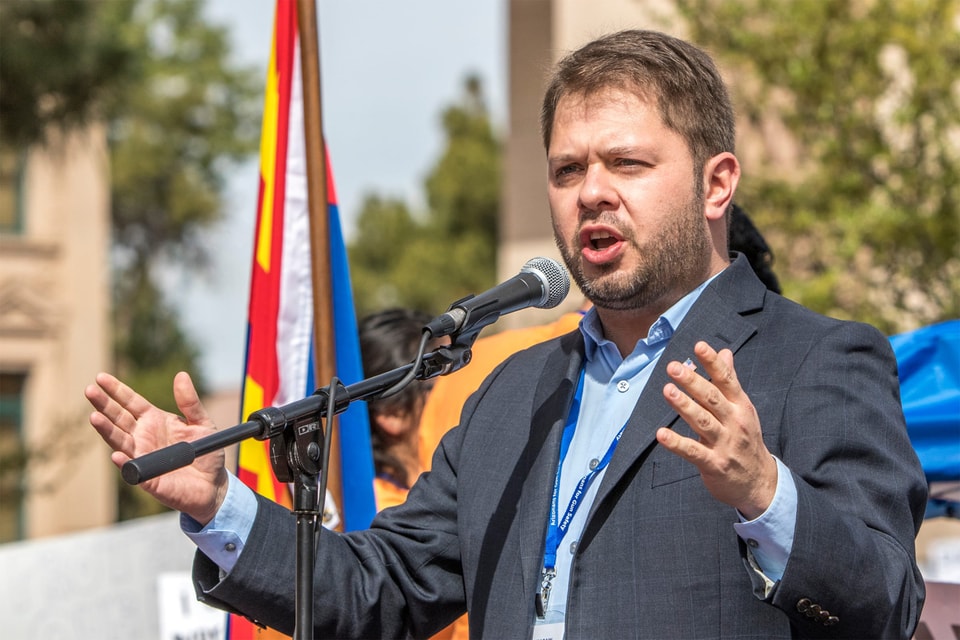Memo Published May 20, 2025 · 5 minute read
Running on Immigration: The Gallego Blueprint
Jeremy Odrich

In the lead up to the 2024 election, voters consistently identified the border as a top priority, and they overwhelmingly said they trusted Republicans over Democrats to handle it. Democrats struggled to proactively define themselves on immigration, and as a result, they paid the electoral price. Yet in Arizona, a border state that Trump won by over five points, Ruben Gallego won his Senate race by leaning in on an issue with which so many Democrats struggle. A case study of how Gallego handled immigration in his race reveals how Democrats can regain the trust of voters on this electorally-potent issue.
Gallego’s Core Immigration Message: Order at the Border
Arizona is an electorally complex state. Republicans tend to win the state’s presidential elections, but Democratic candidates have found success in running for Arizona’s senate seats and governorship. A plurality of its voters are Republicans (36% compared to 29% Democrats), and it just so happens to sit on our southern border in an election year in which immigration was a top issue. Yet Ruben Gallego took the fight to Republicans on immigration, ignoring traditional political wisdom that counsels not to “play on your opponents’ turf.” Democrats have often been advised to avoid talking about issues on which they have a disadvantage, such as crime and immigration. But ignoring an issue, especially one as salient as this, means allowing your opponent to define you, and Gallego knew he didn’t want Kari Lake defining his immigration stance.
Gallego went on offense with a clear message: restore order to our border while providing pathways to legal status for people already here. Gallego said repeatedly during the campaign, “That’s where Arizonans are. They want border security, but they also want to fix our broken immigration system.” Notably, while Gallego took a “both, and” approach, he chose to place his primary emphasis on border security. Voters already know that Democrats want to expand legal pathways, but thanks to Republican misinformation and Democratic silence, voters think Democrats don’t care about border security. That’s the perception Gallego knew he had to rebut to win.
In an election year in which voters viewed the border as chaotic and out of control, Gallego positioned himself as a fighter. On the campaign trail, Gallego repeatedly voiced clear support for increased funding, technology, and personnel at the border. Once he established his border security bona fides, Gallego then made clear his belief in sensible immigration reforms that would allow those who have contributed to our communities for years to earn legal status and fix the system moving forward. But even more important politically, Gallego routinely criticized the Biden administration for not doing enough to address border security. By breaking with his party, Gallego distinguished himself from the Democratic brand’s baggage with voters on immigration and framed his campaign as pragmatic rather than partisan.
Ruben Gallego deployed this message across televised ads, debate performances, and in-person campaign events. His most popular immigration ads featured a consistent refrain: restore order at the border, increase resources for border patrol, and focus on pragmatism over partisanship. One prominent ad featured the Santa Cruz County Sheriff, an unlikely law enforcement messenger, praising Gallego for being the only member of Congress to regularly come to the border. Where other Democrats might have run from border security messaging, Ruben Gallego leaned in.
In his debate with Kari Lake, immigration took up 30 of their 60-minute faceoff, demonstrating its salience in the race. Lake’s attacks were predictable, tying Gallego to Biden on the border and claiming he supported an “open border” policy. But Gallego inoculated against Lake’s attacks by stating clearly “a community that doesn’t have border control is not a country.” He then pivoted to a defense of expanded pathways for Dreamers, but only after establishing his belief in strong border enforcement.
The other core component of Gallego’s strategy was his targeted messaging and outreach to Latino voters. Latinos make up 25% of Arizona’s electorate and are the second-fastest growing bloc in the country. From 2020 t0 2024, Trump gained nearly 10 points among Latino men. Gallego’s advice to fellow Democrats for appealing to Latino voters was straightforward: “Talk to them. And talk to them as often as possible.”
Gallego’s campaign focused on meeting Latino voters where they were—hosting rodeos, watch parties for boxing matches, and cookouts. In talking to Latino voters, they found what polling confirms: Latino attitudes toward immigration and the border are nuanced. Three-quarters of Latinos described the rise in border crossings under Biden as a “major problem” or “crisis,” contrary to what some advocates argued. So Gallego’s team made his first Spanish-language ad focused on border security to gain trust on the issue.
The Results
While Donald Trump won Arizona with the largest margin of victory for a Republican presidential candidate since 2012, Ruben Gallego won the state’s Senate race, outperforming Harris by eight points. Among Latino voters in particular, this gulf was even wider, with Gallego winning them by 22 points compared to Harris’s 10.
Gallego’s victory is not solely due to his approach to immigration, but his “both, and” approach with an emphasis on border security, and the distance he created from Biden on the issue, undoubtedly played a large role in his victory. And by deploying his message widely and proactively defining himself on a contentious issue, Ruben Gallego created credibility so he could go on offense on other key voter concerns like the economy and reproductive rights.
Conclusion
The lesson from Ruben Gallego’s race is simple. On issues like immigration, Democrats must proactively define themselves and lean in, lest they cede ground to their opposition and allow Republicans to control the narrative. Voters know immigration is complex, and a platform that recognizes the need to restore order to the border while providing expanded pathways and protections for those already here is a demonstrated winner.
